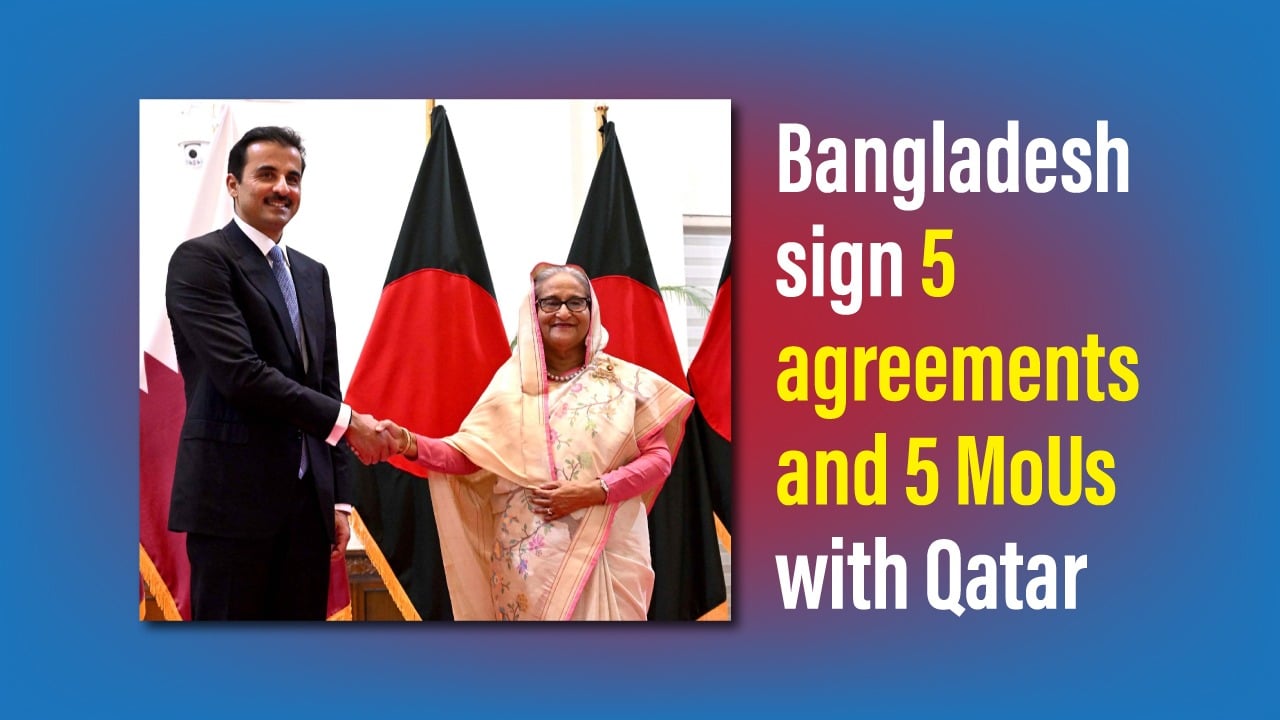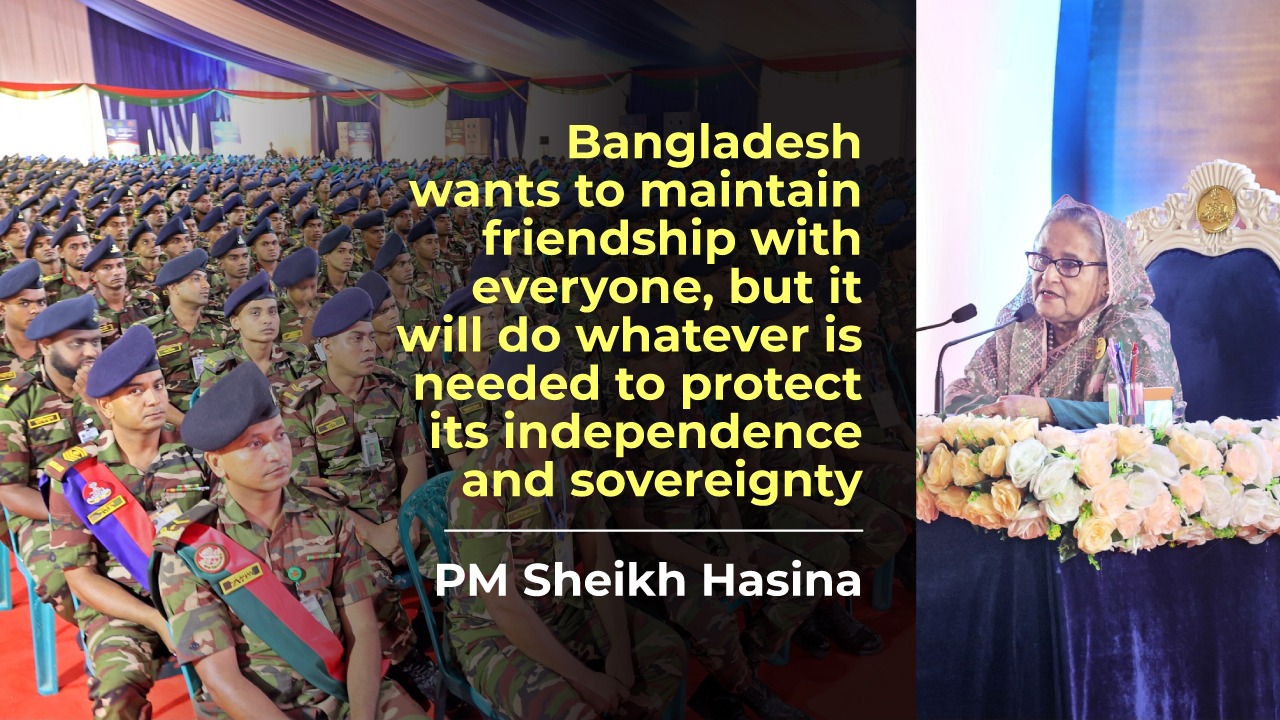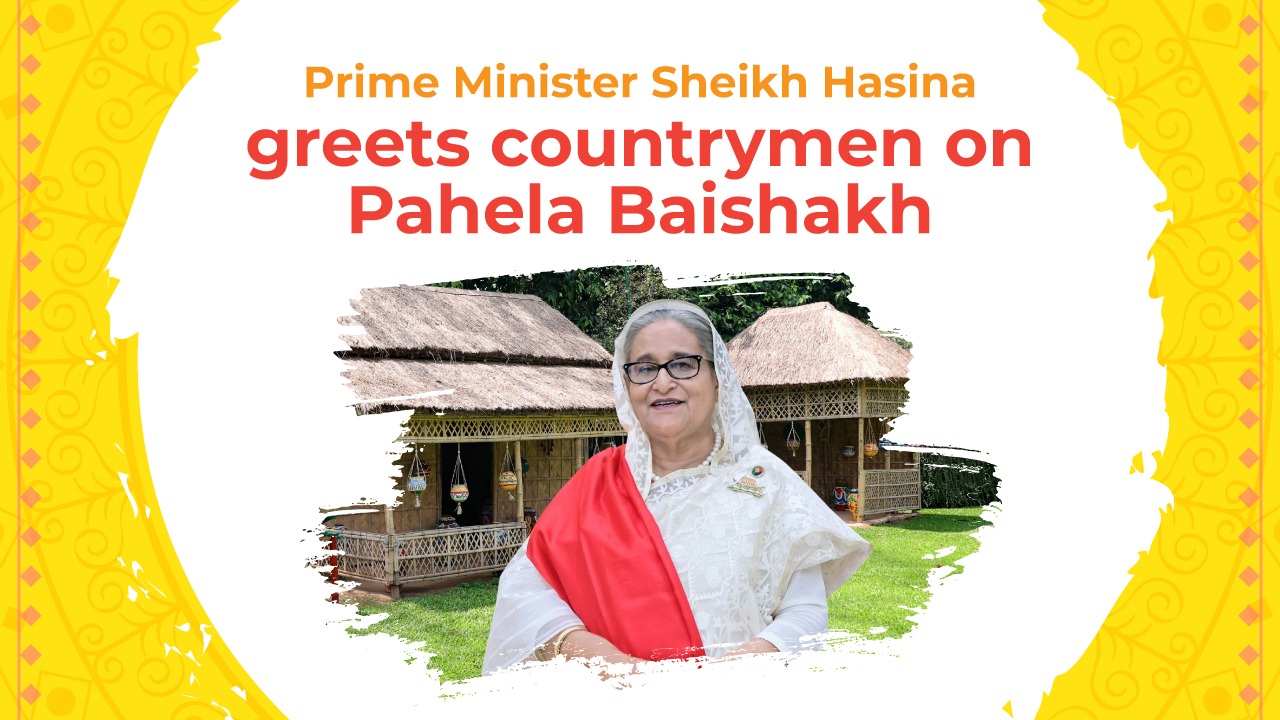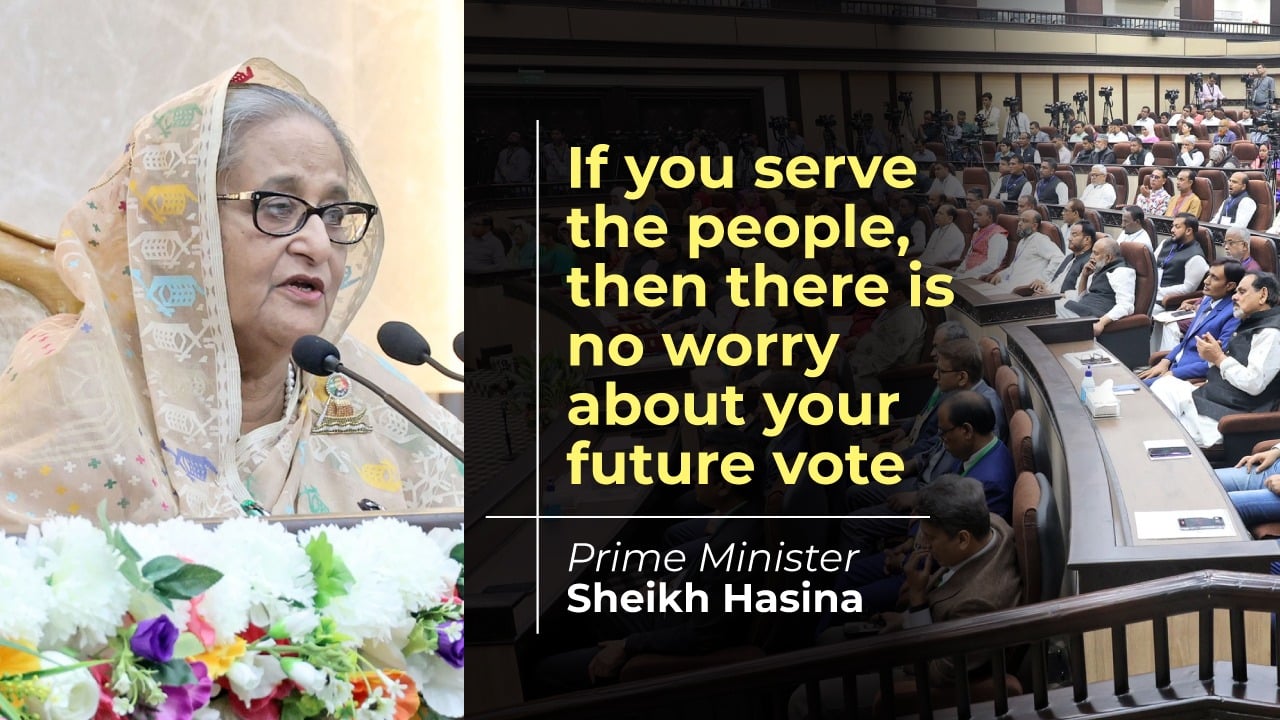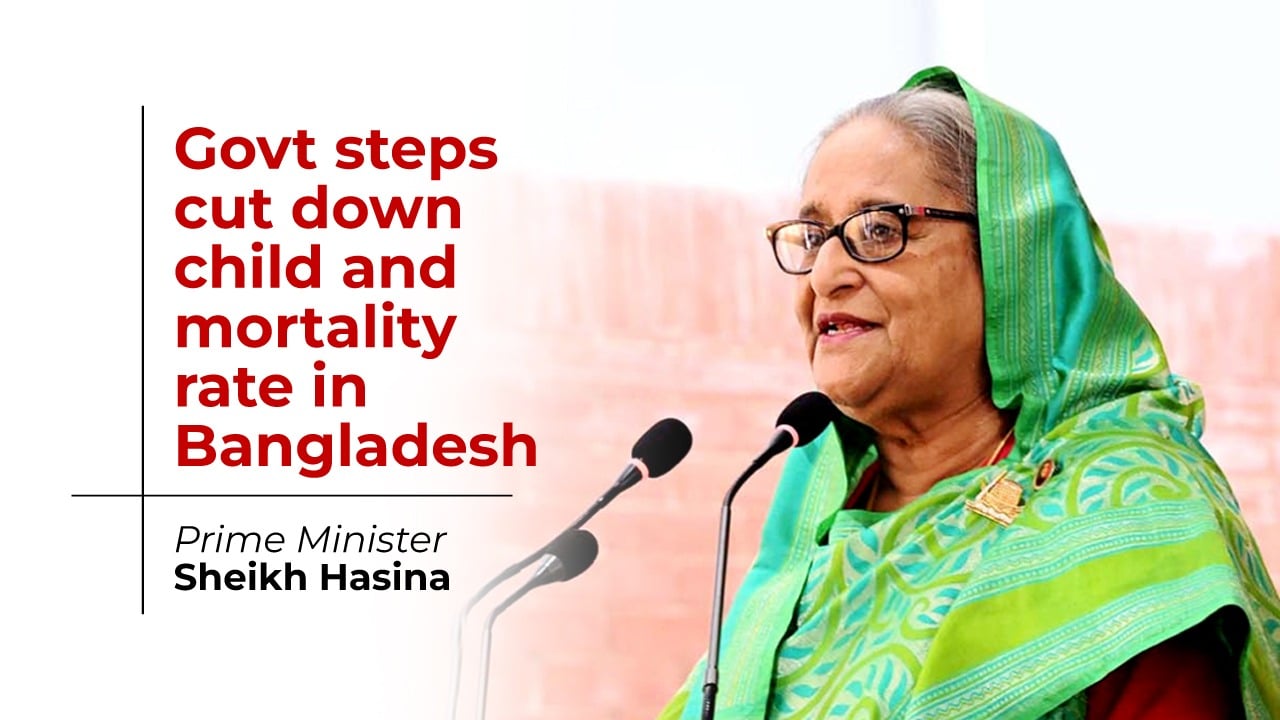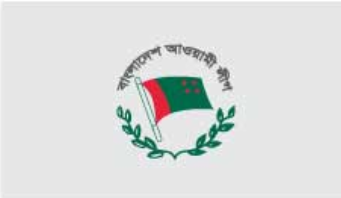4259
Published on September 1, 2016Bangladesh's fight against terrorism and violent extremism is continuing despite the shock and sorrow caused by the terrorist attacks in Dhaka and Kishoreganj which claimed altogether 26 innocent lives, including 4 policemen. While the Awami League Government has been very successful generally in countering terrorism and violent extremism, the said attacks have provided the impetus for enhanced security and law enforcement efforts.
Since the attacks, the law enforcers and prosecutors have stepped up their efforts to apprehend and bring to justice those who have declared war on the state and its people. Honorable Prime Minister Sheikh Hasina led Awami League government has also boosted its community efforts to socially and ideologically defeat the virulent justifications put forward by the terrorists and extremists for their dastardly acts. The Awami League led 14 Party Alliance has also started its political campaign to put a united front against terrorists with the participation of people from all walks of life.
This special report looks at the recent law enforcement, legal, political and social steps taken or initiated by the Awami League led government since the said attacks.
Major Counter Terror Operations
Operation Storm 26: On 26 July, 2016, a special police drive termed 'Operation Storm-26' was conducted in a suspected militant hideout in Dhaka's Kallyanpur area, where nine militants were killed and two detained. Police Special Weapons And Tactics (SWAT) team led different units of Dhaka Metropolitan Police (DMP) in the drive. The operation started from 5:51am and ended at 6:51am. There were no casualties on the police side. The operation was hailed as a major counter terrorism success by analysts and experts.
Operation Hit Strong 27: On 27 August, 2016, a special counter terrorism raid termed "Operation Hit Strong 27' was conducted at a hideout in Paikpara, Narayanganj. Lauded as a major success in recent counter terror efforts, the operation saw 3 terrorists, including the mastermind of the Gulshan attack Tamim, killed by the law enforcement agents. It has been widely reported that Tamim Chowdhury, an expat from Canada, led the newer, more violent, version of JMB in Bangladesh, modeling themselves after the extreme violence favoured by ISIS. Termed a 'terror kingpin', his killing has therefore, given a sense of confidence to the law enforcement and people alike.
Legal Measures
Charges Brought: Bangladesh has continued to prosecute those accused of terrorism and violent extremism. For a list of the progress in earlier cases, click here. As many as 12 cases out of a total of 37 cases filed against the militants, including the Japanese national Kunio Hoshio and Italian Caesar Tabella murders, were disposed of by submitting charge-sheets before courts. The rests of the cases are under investigation. As is noted below, several arrests have been made as regards the cases under investigation. Notable charge framings in recent times include:
i) On 30 June, 2016, police filed charge sheet against six members of banned militant outfit Jama'atul Mujahideen Bangladesh (JMB) for shooting Ruhul Amin, a Bahai community leader in Rangpur in November last year. They were also involved in the killing of Japanese national Kunio Hoshi and Khadem Rahmat Ali in Rangpur's Kaunia upazila on October 3 and November 10 respectively and charge sheets were filed on July 3 accusing eight and 14 JMB men.
ii) Charges were brought against 14 suspected members of banned militant outfit Jama'atul Mujahideen Bangladesh (JMB) for their alleged involvement in the killing of a Khadem (supervisor) of a Mazar (shrine) in Kaunia upazila of Rangpur last year. The investigation officer of the case, submitted the charge sheet to a Rangpur court on July 3.
iii) On 10 July, 2016 police submitted charge sheet in connection with the killing of Joggeshwar Roy, who was killed by militants at Debiganj in Rangpur. The people who have been made accused in the charge sheet are Jahangir Hossain, Rajibul Islam, Md Saddam Hossain, Md Nazrul Islam, Md Alamgir Hossain, Md Ramjan Ali, Md Harez Ali, Khalilur Rahman, Md Rana and Md Shafiul Alam. They belong to banned militant outfit JMB and so-called student-wing of Jamaat E Islami, Islami Chatroi Shibir. Three accused of the case have already confessed to killing of the priest.
iv) On 10 July, 2016, police in Kawnia, Rangpur submitted charge sheet indicting eight militants of Jama'atul Mujahedeen Bangladesh (JMB) after investigation into the murder case of Japan's citizen Hoshi Kunio. Three of these militants have already been put behind bars by the law enforcers. The Japanese national was killed in October, 2015.
v) On 19 July, 2016, police formally charged eight suspected terrorists in court in the 2015 ISKON temple bombing that had several injured in Kaharol Upazila in Dinajpur district. Among the eight charge-sheeted individuals, JMB members Shariful Islam alias Denis, Mosabbirul Alam Khondokar, Sarwar Babu and Abdur Rahman Pintu are lodged in the district jail.
vi) On 20 July, 2016, a Dhaka court framed charges against five members of the banned militant outfit Ansarullah Bangla Team (ABT) in connection with the killing of blogger Oyasiqur Rahman Babu in March last year. The accused are Zikrullah alias Hasan, Ariful Islam alias Mushfiq, Md Saiful Islam, Akram Hossain Hasib alias Abdullah and Junayed alias Taher. The trial is now ongoing.
Arrests Made: The security forces in Bangladesh have continued their raids for apprehending those involved in terrorism, militancy and violent extremism. Some such notable drives/arrests include:
- From 10 July, 2016, in a weeklong drive against terrorists and militants, Bangladesh's security forces arrested 194 suspects, including those belonging to banned outfits like Jamaat-ul-Mujahideen Bangladesh (JMB), Hizb ut-Tahrir, Ansarullah Bangla Team, Ansar-Al-Islam, Harqat-Ul-Jihad, Allaher Dal etc. During the drive, police also recovered arms and ammunitions and literature promoting violent extremism and terrorism from the possession of those arrested.
- On 5 July, police arrested three female members of outlawed Jama'atul Mujahideen Bangladesh (JMB) at Kalihati upazila in Tangail. Acting on a tip off, law enforcers raided a house near the level crossing at Jokarchar in Kalihati and arrested the women. They also seized two machetes, one knife, a mobile phone containing videos of slaughtering techniques and a script containing techniques of making bombs from their possession. A case was filed against the women and their husbands with Kalihati police under the anti-terrorism act.
- On July 11, 2016, police arrested four suspected members of banned militant outtfit Ansarullah Bangla Team (ABT) from Sitakunda area of Chittagong. Upon receiving a tip, a team of police conducted a drive in the area and arrested them. The law enforcers also recovered some hand made weapons from their possession. For security purposes, the identity of the arrestees have not been revealed.
- On 12 July, 2016, police arrested a female Jamaat leader and six Islami Chhatra Shibir leaders and activists and recovered 21 crude bombs and extremist books from their possession in Tangail and Dinajpur.
- On 13 June, 2016, police arrested four suspected militants and recovered one shutter gun, three rounds of bullets, one empty cartridge, and some extremist books from their possessions at Koyra Upazila of Khulna.
- On 14 July, 2016, Rapid Action Battalion arrested two suspected operatives of the banned militant outfit, the Jam’aatul Mujahidin Bangladesh (JMB). Pistols, ammunition and hand bombs were recovered from the possession of the two suspected terrorists, arrested from Uttara Dhaka.
- On 18 July, 2016, police arrested four suspected members of outlawed militant group Jama'atul Mujahideen Bangladesh (JMB) from a dormitory at Uttar Kamarpara in the Kurigram district. Tipped off, a team of police raided 'Tawhid Dormitory' in the area around 4 pm and arrested the four suspected JMB men, Ripon Miah, Nur Alam, Azizur Rahman Aziz and Shah Jamal.
- On 21 July, 2016, Rapid Action Battalion (RAB) has raided a hideout of militant outfit Jama'atul Mujahideen Bangladesh (JMB) in Gazipur's Tongi area and arrested four JMB activists, including a regional chief of the banned group. A huge quantity of weapons, ammunition and bomb-making material were recovered from the house during the raid.
- On 24 July, 2016, detectives arrested three suspected members of Harkat-ul-Jihad-al-Islami (Huji) from Dhaka's Kotwali area. They are Nazim Uddin, 40, president of the Dhaka north unit of the banned militant outfit, and activists Anas, 21, and Saiduzzaman, 28, Masudur Rahman. During primary interrogation they confessed to being active members of the group. A case has been filed accusing the trio under Anti-Terrorism Act.
- On 26 July, 2016, police arrested four activists of banned militant outfit Hizb ut-Tahrir after raiding different areas at Bakalia and Panchlaish in Chittagong. The arrestees, all Chittagong based students, are: Faisal Aziz alias Ador, Sultan Mahmud Bidyut, Fakhrul Abedin and Ariful Islam. Police also recovered a huge number of leaflets, jihadi books and membership forms of Hizb ut-Tahrir from them
- On 28 July, 2016, law enforcers in separate countrywide raids over a 24-hour-period apprehended at least 52 militant suspects, belonging to banned militant outfits like Hizb-ut-Tahrir and Jama'atul Mujahideen Bangladesh (JMB).
- On 16 August, police arrested 4 female members of Jam'aatul Mujahidin Bangladesh (JMB), one an intern of Dhaka Medical College Hospital and the other three being students of Manarat International University --from Dhaka and Gazipur cities.
- On 18 August, 2016, acting on information received from the above mentioned arrested women JMB operatives, police also arrested a male member of the banned militant outfit JMB, Fuad-Al-Mahadi, from Lake Circus Road in Kalabagan, Dhaka.
- On 20 August, 2016, police arrested three members of banned militant outfit Ansarullah Bangla Team (ABT) from Double Mooring, Shikalbaha and Dhalghat areas of Chittagong.
- On 26 August, 2016, police arrested four suspected leaders and operatives of banned militant outfit Ansarullah Bangla Team (ABT), including its Faridpur region commander, in raids on different areas of Faridpur district.
Enhanced Security Measures
- The law enforcement agencies have been asked to ensure adequate security and safety measures for the importers, exporters and foreigners and key installations in the country. They were also asked to remove unauthorized and illegal educational institutions, hotels, restaurants, guest houses from Gulshan and other residential areas of the capital immediately.
- The law enforcement agencies have been asked to ensure adequate security and safety measures at the key-point installations (KPI), important establishments, railway stations and throughout the rail-tracts, public places, bus-stops, launch terminals and other places where people usually assemble.
- Security measures have been tightened at all domestic and international airports to ensure safety of air travelers. From now on passengers would have to go through multiple layers of security checks before entering the airport premises and boarding a plane in the country's three international and 12 domestic airports that are operating 38 airlines within and outside the country.
- The government is now providing security to the people working at the sites of the Japan-funded projects and other key infrastructural project sites such as that of the Padma Bridge.
- On July 11, 2016, Bangladesh's elite crime fighting force, Rapid Action Battalion (RAB), today introduced a mobile apps 'Report 2 RAB' aimed at facilitating the people to send information and photos of criminal activities of their localities that help the force to effectively fight terrorism and militancy. The people using the apps can inform RAB of criminal activities, militancy, terror attacks, missing person's whereabouts, murder, robbery, drug trading, abduction and other crimes of their localities, an official release said.
Administrative Measures
- The government has directed all public prosecutors across the country to strenuously object to bails being granted to suspects in terrorism and militancy cases.
- The Education Ministry has asked the educational institutions to inform the Ministry of the students who are absent for more than 10 days from the institutions. The government is also regularly sitting with the authorities of private and public universities to ensure that radicalization cannot take root in places of academia.
- Sermons delivered by the Imams of the mosques during Jumma prayers would be monitored. The Imam's have been requested to deliver their speeches in accordance to the tenets of Islam and discourage any kind violence being perpetrated in the name of religion.
- The government has already opened a monitoring cell to receive complaints and take necessary actions to check the activities that are considered provocative as it was reported that some of controversial speeches inspired militants to be involved in unleashing terrors. IN line with that policy, the government has already banned the transmission of the controversial Peace TV after it transpired that some of the militants and terrorists were influenced by the contents of some lectures being aired by some preachers.
- The telecom regulator, Bangladesh Telecommunications Regulatory Commission (BTRC), has decided to build the capability to block internet access in a certain area within minutes under special circumstances, for times of emergency such as terrorist attacks. It now takes around 3-4 hours to do so, and the government wants to boost its capacity to take desired step within 10 minutes to one hour.
- The government has announced that it will reward the field-level officials and employees of the Local Government, Rural Development (LGRD) and Cooperatives for providing information on militants. Directives have been given for providing special messages and reinforcing the security arrangement of different bodies and directorates under the Rural Development and Cooperative division to check any possible militant attack.
Social Movement
Largest anti-terrorism protest staged by students: On 1 August, 2016, more than 100,000 students in Bangladesh linked their hands to form human chains to protest two attacks last month by a handful of extremists. The students from hundreds of colleges and universities in Dhaka and other cities took part in the protest as part of a campaign to create awareness against terrorism. The call for fighting terrorism came from human chains formed by teachers and students on their campuses or in front of their educational institutions across the country from 11:00am to 12:00 noon. Participants were seen holding placards and banners inscribing different slogans like “Bangladesh Against Terrorism”, “We will resist militancy by togetherness and firmness”, “Non-communalism is our pride”, and “We want peace, not terrorism: we want fearless life.”
Anti-Terrorism Sermons: Since 15 July, 2016, Imams of mosques across the country have been delivering "Khutba" (sermon) before and after Jumma prayers highlighting the directives of the Holy Quran and Hadith against militancy and terrorism. The Khutba cautioning the countrymen against unrest, militancy and terrorism was delivered almost at all the mosques across the country, including the capital, during Jumma prayers. Islamic foundation earlier sent the copy of Khutba to all mosques across the country. The imams, during the Khutba in the Jumma prayers, urged parents and guardians to keep a watchful eye on their children's movement as well as the movement of strangers in their locality.
International Cooperation
- China has come forward to discuss on how both Bangladesh and China can strengthen cooperation in fight against terrorism. To that end, Chinese officials, including Cao Xiaolin, Deputy Director General of the Department of External Security Affairs, Chinese Foreign Ministry, had meetings with Bangladesh government officials on August 28-31 and discussed various ways of cooperation.
- On 29 August, 2016, US Secretary of State John Kerry came to Bangladesh on a day-long visit during which time counter terrorism cooperation was high on the agenda. During his stay, he expressed the view that Bangladesh government is not sitting idle. During his meetings with the Prime Minister Sheikh Hasina, Foreign Minister and Home Minister, Mr. Kerry assured Bangladesh of his country's all out and stepped up support for countering the menaces of terrorism and violent extremism.
- On 20 August, 2016 India and Bangladesh unanimously decided to set up a joint working group to monitor and exchange information to counter terrorism and communalism. According to Bangladeshi Information Minister Hasanul Huq Inu, the two countries are set to sign a MoU to share information and to set up a joint working group immediately. It will monitor and disseminate information. The agreement came when the Minister met his Indian counterpart Venkiah Naidu.
- On 19, August 2016, Secretary General of Organisation of Islamic Cooperation (OIC) Iyad Ameen Madani reiterated his organization's support to Bangladesh to counter terrorism and emphasized on cooperation of member countries. He lent the support when the OIC Secretary General had a meeting with Bangladesh Foreign Minister A H Mahmood Ali in Dhaka.
- On 19 August, 2016, the UN Resident Coordinator in Dhaka Robert Watkins assured of working with Bangladesh to prevent violent extremism and also lauded the security measures taken by the government following the Gulshan incident.
- On 25 July, 2016, Bangladesh reaffirmed its commitment to join forces to fight those responsible for the recent terrorist attacks perpetrated in various parts of the world in accordance with the UN Charter and other international law. Foreign Minister AH Mahmood Ali conveyed Bangladesh's position condemning all the recent terrorist attacks in the world and said Bangladesh maintains 'zero tolerance' against terrorism of all its forms and manifestation. He made the remarks while delivering his statement at the 23rd ASEAN Regional Forum (ARF) meeting held in Laos PDR on July 25-26.
- The Asia-Europe Meeting (ASEM) leaders have highly praised Prime Minister Sheikh Hasina for her strides to combat terrorism and assured that their countries would remain with Bangladesh in fighting the demon. The appreciation came during Prime Minister Sheikh Hasina’s meetings with Mongolian President Tsakhiagiin Elbegdorj, Myanmar President Htin Kyaw, Indian Vice President Hamid Ansari and Dutch Prime Minister Mark Rutte on the fringes of the ASEM Summit on 17 July, 2016 at UIaanbaatar, Mongolia.
Anti-Terror Financing
Bangladesh has fared much better than many South Asian countries in the 2016 anti-money laundering or terrorist financing index published in the first week of August. The Basel Anti-Money Laundering (AML) Index is being published by the Switzerland-based Basel Institute on Governance (Basel Institute) since 2012. Bangladesh with a score of 6.4 ranked 54 in the world. In South Asia, only India is in a better position than Bangladesh with a score of 5.69. The Index measures the risk of money laundering and terrorist financing of countries based on publicly available sources. A total of 14 indicators dealing with AML/CFT regulations, corruption, financial standards, political disclosure and rule of law are aggregated into one overall risk score.
ISIS or Homegrown Terrorists
A debate resurfaced in the wake of the July terror attacks as to whether there is presence of terrorist outfit ISIS/ISIL in Bangladesh. The authorities in Bangladesh have consistently maintained that there is no 'presence' as such of ISIS in the form of foreign fighters in the soil of Bangladesh but rather there are homegrown terror/militant outfits like the JMB who share the same ideology as that of ISIS/ISIL. The United States has lent its support to Bangladesh in this regard by saying that the recent acts of terrorism in various countries “have been homegrown” and they have the same views with Bangladesh government over the recent attacks here.
According to the US Ambassador Marcia Bernicat: "I don't think we've a difference in the way we view your government's view of what's happening here. I think our views are very similar”. This was reaffirmed by US Secretary of State John Kerry, who on 29 August responded to a question this regard thus: There is evidence that ISIL in Iraq and Syria has contacts with about eight different entities around the world, and one of them is in South Asia. And they are connected to some degree with some of the operatives here, and we made that very clear in our conversation. There was no argument about it. I think when the minister says, “home grown,” it’s not a foreign fighter who’s coming in to do it, it’s somebody here who’s chosen to do it. But that doesn’t mean it wasn’t influenced by elsewhere – on the internet, social media, and so forth.
